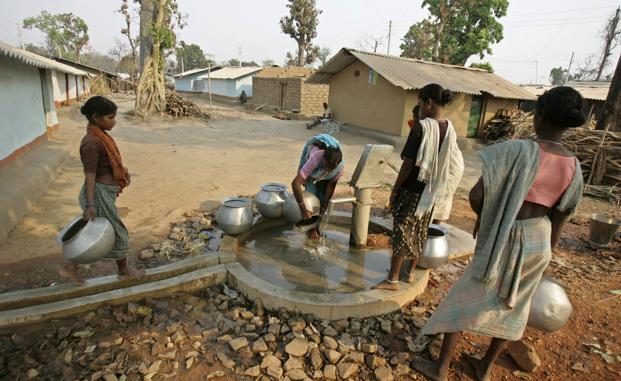
Ichhawar, Madhya Pradesh : The bustling community health centre (CHC) in Ichhawar in the Sehore district of Madhya Pradesh is surprisingly clean even though it’s teeming with patients and their families, who sit huddled across the compound with their medicines, tea and snacks. They throw rubbish in bins and though people chew betel, no one spits on the spotless walls.
The Ichhawar centre is the state’s first ISO 9001-certified CHC. “This CHC was built in 1956, its walls are made of mud. We worked on the existing structure, improved ventilation, installed solar panels, and are now adding private rooms, including an air-conditioned one, for which we will charge R 300,” said block medical officer Dr BB Sharma, who heads the 30-bed CHC that feeds a population of around one lakh. Rs 300 get patients a long way at the Ichhawar CHC, where the OPD charges are Rs 5, hospital admission costs Rs 10, and a non-AC private room costs Rs 100 a day.
The centre is also among a handful of India’s CHCs that have adopted WASH (water, sanitation and hygiene) practices. “Training staff on hygiene and providing facilities such as elbow taps, autoclaving equipment, waste segregation, clean toilets and drinking water has helped infection control not only in the operation and labour rooms but across the centre,” said Dr Sharma.
Baby boom
The results show. Almost all (99%) women in this peri-urban district deliver at the CHC, with around 2,000 deliveries taking place each year. Newborn deaths are rare and less than 15% cases are referred to the district hospital because of complications, such as indications of preterm birth or a caesarean section.
Around six babies are born each day. Obstetrictician-gynaecologist Dr Madhu Sharma was delivering the fourth healthy baby of the day by 5 pm on Thursday this week. She was in relay-mode, handing the baby over to the staff nurse before scrubbing her hands to attend to the other three mothers undergoing birth pangs in the labour room.
All four babies are healthy, weighing 3.7 kg, 3.5 kg and 2.6 kg. “The fourth baby was yet to be weighed, but it seems around 3 kg. The mothers are fine, none of them are anaemic and all will be discharged in 48 hours,” said staff nurse Sangeeta, who goes by one name.
Around 1.2 million children die before their fifth birthday in India, which puts the country’s under-5 mortality rate (under-5 deaths/100,000 live births) at 45. India also has the highest newborn deaths in the world, with an estimated 707,032 babies dying within the first 28 days of birth each year, shows data from the new Unicef report, Narrowing the Gaps: The Power of Investing in the Poorest Children.
In Madhya Pradesh, an estimated 68,000 infants die within 28 days of birth and about 100,000 before their first birthday, with the high maternal mortality — 227 per 100,000 live births — also contributing to newborn deaths. A majority of these deaths occur among underserved Scheduled Tribe population, which accounts for 21.1% of state’s 72.6 million population, shows 2011 Census data.
Clean India
Since most newborns die within the first seven days of birth and among them, 70% die within the first 24 hours, adopting good hygiene and clinical practices during and after childbirth saves lives by lowering infection and sepsis, which accounts for 30% of newborn deaths.
The WASH initiative was started as a pilot by National Health Mission, Madhya Pradesh government and Unicef in 2016 in seven district hospitals, 43 CHCs, 25 primary health centres and one sub-centre in the seven “high priority districts” of Guna, Shivpuri, Sheopur, Mandla, Umaria, Anuppur and Shahdol. Implementation is tracked on a dashboard based on 60 key WASH, indoor cleanliness and biomedical waste management indicators, which are reviewed bimonthly for course correction.
“Improving infection control and WASH practices in labour rooms, SNCUs (sick neonatal care units), paediatric wards and nutrition rehabilitation centres will not only reduce maternal, newborn and infant deaths due to sepsis, but also help to reduce morbidity, cost of treatment, duration of hospital stay and antibiotic use,” says Michael Juma, UNICEF Madhya Pradesh, which is partnering with the state government.
Next comes scaling up to another 67 high delivery centres to cover 95% of births in these seven districts. And with that, thousands of newborns and mothers will be saved each year.
Source: Hindustan Times

Leave a Reply